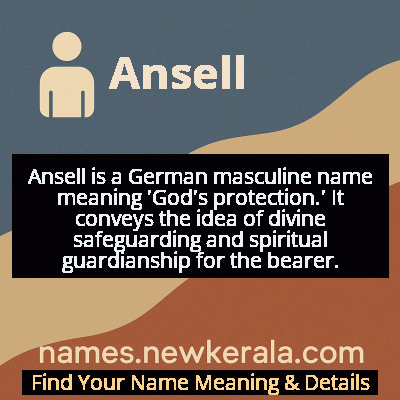Ansell Name Meaning & Details
Origin, Popularity, Numerology Analysis & Name Meaning of Ansell
Discover the origin, meaning, and cultural significance of the name ANSELL. Delve into its historical roots and explore the lasting impact it has had on communities and traditions.
Name
Ansell
Gender
Male
Origin
German
Lucky Number
9
Meaning of the Name - Ansell
Ansell is a German masculine name meaning 'God's protection.' It conveys the idea of divine safeguarding and spiritual guardianship for the bearer.
Ansell - Complete Numerology Analysis
Your Numerology Number
Based on Pythagorean Numerology System
Ruling Planet
Mars
Positive Nature
Generous, passionate, energetic, and humanitarian.
Negative Traits
Impulsive, impatient, moody, and can be overly emotional.
Lucky Colours
Red, maroon, scarlet.
Lucky Days
Tuesday.
Lucky Stones
Red coral, garnet.
Harmony Numbers
1, 2, 3, 6.
Best Suited Professions
Military, sports, philanthropy, leadership roles.
What People Like About You
Courage, energy, leadership, generosity.
Famous People Named Ansell
Ansell Adams
Photographer
Revolutionized landscape photography and environmental conservation
Ansell Collins
Musician
Influential Jamaican reggae and dub keyboardist and producer
Ansell Easton
Businessman
Founded global protective gloves manufacturer Ansell International
Ansell John
Cricketer
West Indian cricketer for Windward Islands and international matches
Name Variations & International Equivalents
Click on blue names to explore their detailed meanings. Gray names with will be available soon.
Cultural & Historical Significance
During the Middle Ages, Saint Anselm of Canterbury, an important medieval philosopher and theologian, helped popularize variations of the name across Europe. His intellectual contributions to scholastic philosophy and his role as Archbishop of Canterbury gave the name academic and religious prestige that endured for centuries. The name traveled to England with Norman settlers and became established in British nobility and merchant classes, eventually spreading to Commonwealth countries and the United States through immigration. In Jewish communities, the Yiddish variation 'Anshel' became a common given name, particularly in Eastern Europe, where it maintained similar protective connotations.
Extended Personality Analysis
Individuals named Ansell are often perceived as thoughtful, protective, and intellectually curious. The name's meaning of 'divine protection' seems to manifest in personality traits characterized by a natural inclination toward caretaking and guidance. Ansells typically demonstrate strong analytical abilities and a methodical approach to problem-solving, often excelling in fields that require careful consideration and strategic planning. They tend to be reliable and steadfast, with a quiet confidence that inspires trust in others.
Many Ansells exhibit a blend of traditional values and innovative thinking, making them effective bridge-builders between established practices and new ideas. Their protective nature extends beyond physical safety to emotional and intellectual support for those in their care. While sometimes reserved in new situations, Ansells typically reveal deep loyalty and commitment once relationships are established. They often possess artistic sensibilities or technical aptitudes that allow them to create, build, or improve systems and environments around them, reflecting the name's combination of spiritual meaning and practical application.
Modern Usage & Popularity
In contemporary times, Ansell remains an uncommon but distinguished choice for boys, particularly among families with German or English heritage. The name has maintained a steady but low profile in English-speaking countries, often chosen by parents seeking a traditional name with strong meaning that isn't overly common. While it has never reached the popularity charts in recent decades, it enjoys periodic revivals among parents looking for vintage names with substance. The similar variant 'Ansel' has seen slightly more usage, particularly following the rise of actor Ansel Elgort. Modern Ansells are often found in professional fields such as academia, engineering, medicine, and the arts, where the name's intellectual and protective connotations seem to align well with career paths requiring careful thought and responsibility. The name's rarity in the 21st century gives it an air of distinction and individuality while maintaining its traditional roots.
Symbolic & Spiritual Meanings
Symbolically, Ansell represents protection, wisdom, and divine guidance. The name evokes images of guardianship and safe passage, suggesting someone who serves as a shield against adversity or a guide through challenging circumstances. In metaphorical terms, Ansell symbolizes the intersection of spiritual strength and practical protection—a bridge between heavenly ideals and earthly responsibilities. The name carries connotations of reliability and steadfastness, much like a fortress or sanctuary that provides security and stability. It also suggests the quality of discernment, representing the ability to distinguish between what requires protection and what needs to be released. In broader symbolic terms, Ansell embodies the concept of benevolent authority—leadership that protects rather than dominates, guides rather than commands, and serves rather than rules. The name's Germanic roots connecting divine power with protective strength create a powerful symbolic combination of spiritual authority and practical safeguarding.

